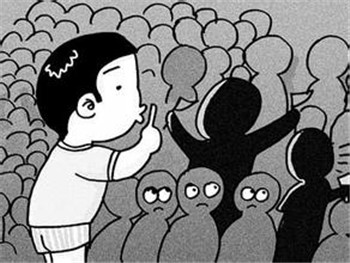
RIO DE JANEIRO — The same shouts can be heard throughout the Summer Olympics, from table tennis and fencing to swimming and beach volleyball events: Silêncio! Shhh!
里约热内卢――从乒乓球馆到击剑馆,从游泳池到沙滩排球场,同样的喊声可能会回响在所有夏季奥运会场:安静!嘘!
While every sport has its own custom for when it is appropriate to cheer and when quiet is expected, none of that applies here. The Rio Games have only just begun, but already the exuberance of local fans has collided with athletes’ and officials’ pleas for silence.
什么时候该庆祝,什么时候该安静,所有体育项目都有自己的惯例,但在这里没有人遵守。里约奥运会刚刚开始,运动员和官员们便开始请求热情洋溢的本地粉丝们保持安静。
We are not used to this in table tennis,” said Galia Dvorak of Spain, who acknowledged that she had been shocked and unnerved by jeers from Brazilian fans during her match. She added, “It was just weird.”
来自西班牙的加利娅•德沃拉克(Galia Dvorak)说,“我们乒乓球比赛不习惯这样。”她承认,在她比赛时巴西球迷们的嘲笑让她震惊和焦躁。她补充说,“就是太怪了。”
At the Olympic Aquatics Stadium, an official twice requested silence from the crowd before a 100-meter butterfly race that featured the Brazilians Daiene Dias and Daynara de Paula. Fans contained themselves just long enough for the races to start before resuming their screaming.
在奥林匹克水上运动体育馆,一场百米蝶泳比赛之前,一个官员两次要求观众保持安静,参赛者当中包括巴西选手黛安妮•迪亚斯(Daiene Dias)和戴纳拉•德•保拉(Daynara de Paula)。粉丝们控制住了自己,但比赛刚一开始,他们马上就开始尖叫。
At the beach volleyball court, fans whistled and jeered when a Canadian team served. The public-address announcer asked them to cheer for everyone.
在沙滩排球赛场上,每当加拿大队发球的时候,球迷就会吹口哨、嘲笑他们。扩音器里的播音员让大家为每个人都喝彩。
During a men’s fencing event, raucous Brazilian fans tossed aside the sport’s typically convoluted rules of decorum — cheering is all right, but only at certain moments — as they shook the stands with continuous spasms of celebration and booed anyone who notched a point against one of their own.
击剑是一项讲究复杂礼仪规则的赛事,欢呼是可以的,但要在特定的时候,然而在一场男子击剑赛事上,喧闹的巴西观众完全不理这一套,看台上不断爆发出阵阵欢呼,如果有运动员从巴西运动员身上赢得一分,就对他报以嘘声。
“It’s an incredible feeling when you enter this arena,” Brazilian fencer Ghislain Perrier said after losing his bout. “You feel all the power of the Brazilian people.”
“走进体育馆,感觉真是不可思议,” 巴西击剑选手吉兰•皮埃尔(Ghislain Perrier)在比赛失利后说。“你能感受到巴西人民的力量。”
The fans’ presence has been most striking, though, at the table tennis arena. Outside a select few countries, the sport struggles to draw fans and generate excitement. Players in the sport value silence, which allows them to hear the way the ball bounces off an opponent’s paddle and to react more smoothly to a shot.
而在乒乓球场馆,球迷的参与最为惊人。除了某几个特定的国家,这项运动在世界其他地方都很难吸引球迷,也很难让人变得激动不已。赛事的选手希望安静,让他们可以倾听乒乓球从对手球拍上反弹的声音,做出更流畅的反击。
The tenor of the match Sunday night between Hugo Calderano of Brazil and Tang Peng of Hong Kong revealed itself before a single point was played.
星期日晚上,巴西的乌戈•卡尔德拉诺(Hugo Calderano)与香港的唐鹏展开对决,比赛尚未开始,赛场里就响彻了男高音般的叫喊。
Calderano, 20, entered the arena like a gladiator, hearing his name bellowed in unison from the stands, and when Tang, 35, hit a warm-up shot into the net, the crowd let out an overjoyed roar of approval. On it went through the match, just like this: Every time Calderano scored, an elated scream; each time Tang erred, yelps of joy.
20岁的卡尔德拉诺像个角斗士一样走进场地,观众席上齐声高呼他的名字,唐鹏35岁,他在热身时把一个球打在网上,人群顿时爆发出欢快的咆哮。比赛进行时则是这样的:卡尔德拉诺每赢一分,就是一阵兴奋的尖叫;唐鹏每失误一次,又是快乐的喊声。
In the realm of table tennis — a subtle sport often likened to chess — these were vividly unusual scenes. But such displays had been going on at the Olympic table tennis pavilion all weekend.
乒乓球是一项很微妙的运动,经常同棋类运动相提并论,在这个领域里,这样一幕很罕见。但在整个周末,这种场面一直在奥林匹克乒乓球馆里上演。
“It’s usually a more serious sport,” said Anderson Monteiro, 40, a casual table tennis fan from Rio de Janeiro as he watched Calderano play. “I think it’s fantastic. It’s wonderful. It’s typically Brazilian.”
“这通常是一项更加严肃的运动,”40岁的安德森•蒙泰罗(Anderson Monteiro)在看卡尔德拉诺比赛时说道;他来自里约热内卢,算不上一个认真的乒乓球迷。“我觉得这样有意思。这样很棒。这就是典型的巴西式。”
Alexandre Araújo, a press officer for the Brazilian table tennis squad, tapped his chest as he explained the fans had “come with a football heart.”
巴西乒乓球队的新闻发言人亚历山大•阿劳约(Alexandre Araújo)拍着胸口解释说,球迷们是“带着一颗足球的心”来看比赛的。
On Sunday, fans hissed when Tang prepared to serve, forcing him on one occasion to step away from the table. That made the fans boo louder. They stopped only to sing to Calderano:
星期日,唐鹏准备发球时,球迷们就会发出嘘声,有一次逼得他只能离开球桌。球迷们看了就更大声地起哄,然后又停下来冲着卡尔德拉诺高歌:
“Vou te apoiar, Hugo!” or “I will support you, Hugo!”
“我支持你,乌戈!”
On Saturday afternoon, while Caroline Kumahara of São Paulo was on her way to losing her first-round match to an opponent from Luxembourg, the Brazilian fans kept their spirits up, doing the wave, rattling noisemakers and serenading her with encouragement, like “Eu sou brasileiro, com muito orgulho, com muito amôr!” (“I am Brazilian, with much pride, with much love!”)
星期日下午,圣保罗的卡洛琳•熊原(Caroline Kumahara)在第一轮比赛里快输给来自卢森堡的对手了,然而巴西球迷们的情绪还很高昂,他们挥舞手臂,摇晃着制造声音的工具,给她唱加油的歌,比如“我是个巴西人,我非常骄傲,我有很多爱!”
“Brazilians are like this,” Kumahara said afterward. “They are always happy, always making fun of everything. This is normal for them.”
“巴西人就是这样,”熊原赛后说。“他们总是那么快活,总是拿什么都开玩笑。这对他们来说很平常。”
It has been highly abnormal for the players, though.
但是对于选手们来说就很不寻常了。
On Saturday morning, Gui Lin, the other woman representing Brazil in singles, stepped away from the table at one point to motion to the stands to quiet her vocal fans — a rather extraordinary move in the wider context of sports. Gui, who said she appreciated the cheers, nevertheless seemed uneasy afterward as she described table tennis as a sport “where you have to be quiet” and the noise as a sign of disrespect.
星期六的晚上,另一位代表巴西参加乒乓球比赛的女子选手林桂一度离开球台,向观众席打手势,希望她的球迷们平静下来——从更广泛的体育竞赛角度而言,这个举动颇不寻常。林桂说她感激他们的加油,但紧接着就不安地形容,乒乓球是一项“必须在安静的环境里进行”的比赛,而噪音意味着一种不尊敬。
“They have to focus,” Gui said of her opponents, “and there are three other tables playing, and I thought it wasn’t right to disturb the others because of me.”
“他们得集中精神,”林桂说起自己的对手们,“当时还有另外三组选手在比赛,我觉得如果因为我就打扰其他人是不对的。”
Gui’s opponent, Dvorak, blamed the crowd’s jeers for her 11-1 loss in the first game.
林桂的对手德沃拉克(Dvorak)在第一局以1比11告负,她觉得这都是观众们的嘲笑造成的。
“Like in other countries, like in China, they cheer a lot, but never against the opponent,” Dvorak said. “They cheer for their players, but never making this ‘ooooh’ against you.”
“在别的国家,比如中国,他们也欢呼,但从来不针对对手,”德沃拉克说。“他们给自己的运动员加油,但是从来不会对着你这么喊‘啊——’。”
Noting the atypical atmosphere at his own match Saturday afternoon, Gustavo Tsuboi of São Paulo guessed that, for all their enthusiasm most of the Brazilian fans on hand, for all their enthusiasm, were not familiar with the customs of the sport.
圣保罗的古斯塔沃•坪井(Gustavo Tsuboi)在周六下午自己的比赛中,也注意到了这种异乎寻常的气氛,他觉得,尽管现场的巴西观众们那么热情,他们其实并不熟悉这项运动的习惯。
“It’s unusual how they react,” said Tsuboi, who said he loved the additional energy. “We are used to having events only with people who already know our sport.”
坪井说,“他们的反应很不寻常。”他还说自己喜欢这种额外多出来的活力。“我们已经习惯了只为懂得这项运动的人举办赛事。”
Not all non-Brazilians were peeved, however. As Tommy Danielsson, the Luxembourg coach, said: “I find it very nice when the audience gets involved. We need this. People can see that this is not just a hobby game you play in a garage at home.”
不过,也不是所有的非巴西人都感到恼火。卢森堡队的教练托米•丹尼尔松(Tommy Danielsson)就说:“我觉得观众能参与进来是很好的。我们需要这样。人们可以看到,乒乓球并不仅仅是一种在家中的车库里玩玩的业余体育爱好。”












